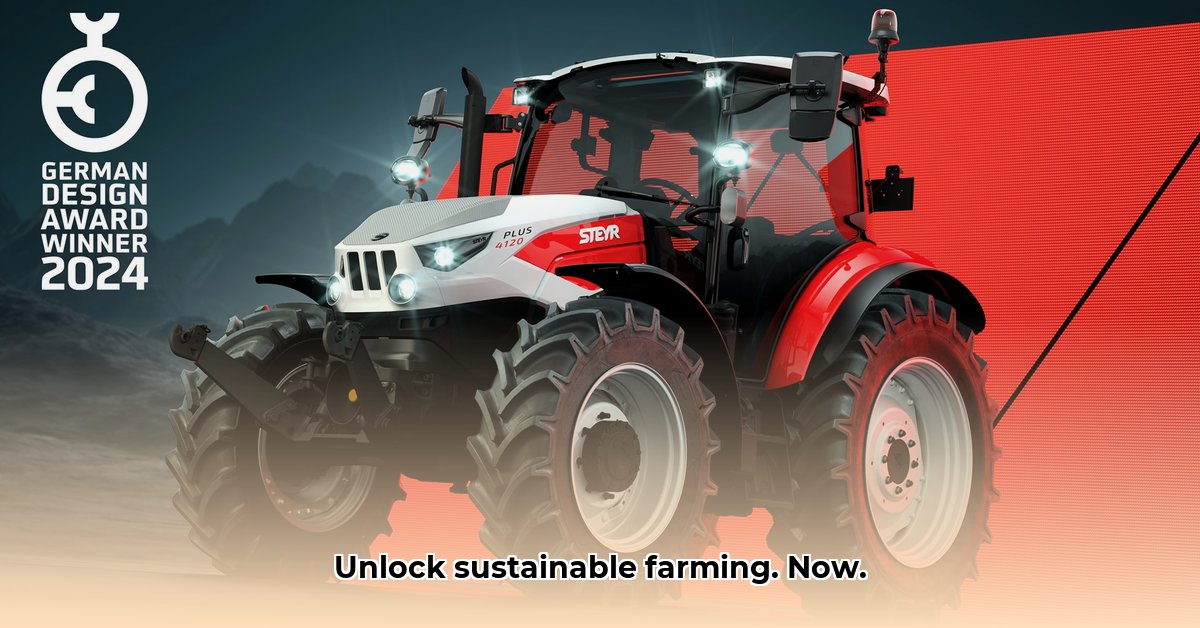
Sustainable farming practices are crucial for securing our food future and preserving the planet. Choosing the right equipment plays a vital role, and Case IH, part of CNH Industrial, offers a range of tractors designed with sustainability in mind. This detailed review examines Case IH's offerings, analyzing their fuel efficiency, technological integration, lifecycle costs, and overall contribution to a more sustainable agricultural landscape. We'll also provide actionable recommendations for farmers, Case IH, and policymakers. For more on large tractor manufacturers, see this useful resource.
Fuel Efficiency: A Key Sustainability Metric
Fuel costs represent a significant portion of farming expenses. Case IH tractors aim for fuel efficiency through advanced engine designs and optimized gearboxes. However, assessing this truly requires concrete data. Specific fuel consumption rates (gallons per acre or liters per hour) for each model, under various operating conditions, are needed for a comprehensive comparison with competing brands. Without this precise data, a complete evaluation of their sustainability claims remains incomplete. This detailed information should be readily available from Case IH and independent testing organizations.
Tech Integration: Precision Farming and its Impact
Many Case IH tractors incorporate advanced telematics, enabling real-time monitoring of fuel usage, engine performance, and even soil conditions. This precision farming approach aims for resource optimization and waste reduction. Yet, this technology brings potential challenges. The dependence on complex electronics raises concerns about maintenance complexity and potential cybersecurity vulnerabilities. A balanced assessment requires considering both the environmental benefits and the long-term implications of this technology's reliance on advanced electronics and software. Further research is needed to fully understand the trade-offs.
Lifecycle Costs: A Holistic Sustainability View
A comprehensive evaluation of sustainability must encompass the entire lifecycle of a tractor. The Total Cost of Ownership (TCO) includes initial purchase price, fuel costs, maintenance, repairs, depreciation, insurance, and potential technological upgrade costs. Ignoring these long-term considerations provides an incomplete picture. For example, a tractor with a lower initial price might lead to higher maintenance or repair costs over its lifespan, effectively negating its initial cost advantage from a sustainability perspective. Detailed maintenance schedules and cost projections are crucial for accurate TCO estimations.
Manufacturing and Environmental Impact: The Unspoken Costs
The manufacturing process itself impacts sustainability. Transparency regarding the materials used, their recyclability, and the overall carbon footprint of production is vital. Are tractors designed for easy disassembly and component recycling at end-of-life? What are the environmental implications of the materials used in construction? Detailed information on the environmental impact of tractor manufacturing is needed to complete the sustainability assessment, and improved design for end-of-life management is essential.
Narrow Footprint Designs: Optimizing Land Use
Certain Case IH models, such as the Farmall N and CL series, feature narrow footprint designs, ideal for specialized farming in environments like vineyards and orchards. These designs aim to minimize soil compaction, improving land use efficiency. However, further research is needed to fully understand the long-term impact of these designs on soil health and broader environmental benefits. How do these design choices contribute to long-term improvements in soil health and overall environmental sustainability?
Collaborative Action for Sustainable Agriculture
Optimizing agricultural sustainability requires a collaborative effort:
| Stakeholder | Short-Term Actions | Long-Term Actions |
|---|---|---|
| Farmers | Thoroughly evaluate tractor suitability; explore financing and fuel efficiency options. | Analyze total cost of ownership; optimize operations for maximum efficiency and minimal environmental impact. |
| Case IH | Publicly release comprehensive TCO data and detailed lifecycle environmental impact assessments. | Invest in R&D for more sustainable designs; develop robust tractor recycling and component reuse programs. |
| Policymakers | Provide incentives for fuel-efficient equipment and sustainable farming practices. | Implement regulations mandating comprehensive environmental impact reporting; support research into sustainable technologies. |
Key Takeaways:
- A comprehensive Total Cost of Ownership (TCO) analysis is crucial for evaluating the true sustainability of farm equipment.
- Transparency from Case IH regarding fuel efficiency, maintenance costs, and manufacturing processes is essential for informed decision-making.
- Collaboration between farmers, manufacturers, and policymakers is needed to foster a truly sustainable agricultural sector.
Dr. Emily Carter, Professor of Sustainable Engineering, Stanford University, emphasizes, "The long-term environmental impact of agricultural equipment extends far beyond initial purchase price. A holistic approach encompassing the entire lifecycle is crucial for achieving true sustainability."
How to Calculate the Total Cost of Ownership (TCO) for Case IH Tractors
Calculating the TCO provides a realistic evaluation of a Case IH tractor's economic and environmental impact over its lifespan. This calculation considers factors beyond the initial purchase price:
Gather Data: Collect information on purchase price, fuel consumption, maintenance estimates, labor costs, depreciation, insurance, and technology costs.
Estimate Annual Expenses: Calculate yearly costs for fuel, maintenance, labor, depreciation, and insurance.
Sum the Costs: Add all yearly expenses (steps 2) to the initial purchase price (step 1) to get the total cost over a chosen timeframe (e.g., 5 years).
Calculate Average Annual Cost: Divide the total TCO by the number of years to determine the average annual cost.
Using a TCO calculator can simplify this process. [1https://www.machinerypete.com/calculators/equipment-cost-calculator/] Remember, accurate TCO calculation is essential for making informed decisions about farm equipment purchases and optimizing profitability while minimizing environmental impact.